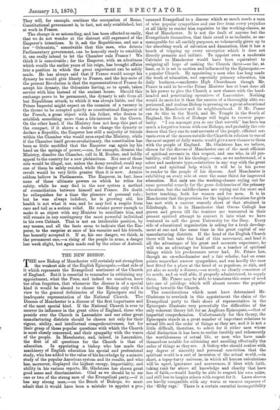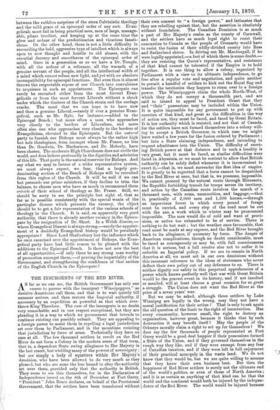THE NEW BISHOP.
THE new Bishop of Manchester will certainly not strengthen the weakest side of the English Episcopate,—that side of it which represents the Evangelical sentiment of the Church of England. But it is essential to remember in criticizing any appointment, what the Press, and indeed we ourselves, have too often forgotten, that whenever the diocese is of a special kind it would be absurd to choose the Bishop only with a view to the general deficiencies of the Episcopate and its inadequate representation of the National Church. The Diocese of Manchester is a diocese of the first importance and of the most special kind. If the National Church is ever to recover its influence in the great cities of England, those who preside over the Church in Lancashire and our other great manufacturing districts should be chosen not only for their vigour, ability, and intellectual comprehensiveness, but for their grasp of those popular questions with which the Church is most closely concerned, and their sympathy with the wants of the people. In Manchester, and, indeed, in Lancashire, the first of all questions for the Church is that of education. In appointing a bishop who has made the machinery of English education his special and professional study, who has added to the value of his knowledge by a minute study of the popular American system and its results, and who has, moreover, displayed the highest energy, impartiality, and ability in his various reports, Mr. Gladstone has shown great good sense and discrimination. Glad as we should be to see one or two of the strong men of the Evangelical party,—if it has any strong men,—on the Bench of Bishops, we must admit that it would have been a mistake to appoint a pro-
nounced Evangelical to a diocese which so much needs a man of wise popular sympathies and one free from every prejudice at all likely to render him repulsive to the working-classes, as that of Manchester. It is not the fault of anyone but the Evangelicals themselves, that their creed is so inelastic, so un- manageable for all earthly purposes, so vehemently given up to the absorbing work of salvation and damnation, that it has a knack of tripping up every enterprize which it does not directly promote and initiate. To appoint even a moderate Calvinist to Manchester would have been equivalent to resigning all hope of making the Church there—so far, at least, as it is set in motion and influenced by the Episcopate,— a popular Church. By appointing a man who has long made the work of education, and especially primary education, his daily business,—moderate High Churchman though Mr. Fraser is said to be—the Prime Minister has at least done all in his power to give the Church a new chance with the hard- headed and penetrating operatives of Lancashire. Nothing would do more for it than the success of a thoroughly able, ex- perienced, and zealous Bishop in pressing on a great educational reform in Manchester and its neighbourhood. If Mr. Fraser can do this in the North, and Dr. Temple in the South of England, the Bench of Bishops will begin to recover popu- larity. " I am amongst you as one that serveth" has been too much a forgotten lesson with our Bishops, and probably the evi- dences that they can be real servants of the people, efficient ser- vants even of the masses outside the Church in relation to one of the most urgent of daily wants, would give a new chance to them with the people of England. Mr. Gladstone has, we believe, chosen for the diocese of Manchester one of the most efficient of spiritual servants in this respect, and one who, in all pro- bability, will not let his theology,—one, as we understand, of a sober and moderate type,—interfere in any way with the great moral and spiritual help which it will be in his power to render to the people of his diocese. And Manchester is exhibiting on every side at once the same thirst for improved education. Not only are the working-classes crying out for some powerful remedy for the gross deficiencies of the primary education, but the middle-classes are crying out for more and better teaching, both for women and for men. It is in Manchester that the provision for the higher education for girls has met with a success scarcely short of that attained in Edinburgh. It is in Manchester that Owens College has grown and grown till the trustees are warranted in their present spirited attempt to convert it into what we have ventured to call the great University for the Busy. Every side of educational organization is asking for a fresh develop- ment at one and the same time in the great capital of our manufacturing districts. If the head of the English Church there will but take the lead of this movement, and lend it all the advantages of his great and accurate experience, he will win an advantage for himself as a teacher of spiritual things which his predecessors never had. Dr. Prince Lee, though an ex-schoolmaster and a fair scholar, had on some points somewhat narrow sympathies, and was hardly the man best fitted for a place at the head of so populous, so rich, and yet also so needy a diocese,—so needy, so clearly conscious of its needs, and so well able, if properly administered, to supply them. Mr. Fraser may be able to transform this sense of need into one of privilege which will almost reverse the popular feeling towards the Church.
The considerations which must have determined Mr. Gladstone to overlook in this appointment the claim of the Evangelical party to their share of representation in the Episcopate illustrate very powerfully the difficulties of the only coherent theory left for an Anglican Episcopate,—that of impartial comprehension. Unfortunately for this theory, the Episcopate stands in a great number of important relations to actual life and the order of things as they are, and it is not a little difficult, therefore, to select for it either men whose chief distinction it has been to realize forcibly and vehemently the worthlessness of actual life, or men who have made themselves notable for criticizing and assailing effectually the order of things as they are. A bishop who should realize with any degree of sincerity and personal conviction that the spiritual world is a sort of inversion of the actual world,—in short, a topsy-turvy universe, in which all human calculations will be upset, ignorance and narrowness, if blest with faith, taking rank far above all knowledge and charity that have less of faith,—would hardly be able to respect his own mitre, and still less to inspire others with respect for it. Lawn sleeves are hardly compatible with any warm or earnest exposure of the `filthy rags.' There is a certain essential incompatibility
between the ruthless surprises of the stern Calvinistic theology and the mild grace of an episcopal order of any sort. Evan- gelicals must fail in being practical men, men of large, manage- able, pliant intellect, and keeping up at the same time the glow and ardour of the predestinarian and vicarious fanati- cisms. On the other hand, there is not a little difficulty in reconciling the bold, aggressive type of intellect which is always open to new thought and hostile to old abuses, with the essential decency and smoothness of the episcopal order of mind. Once in a generation or so we have a Dr. Temple, with all the ardour of a reformer, all the warmth of a genuine servant of the people, and all the intellectual width of a mind which cannot refuse new light, and yet with no absolute incompatibility for episcopal functions. But even then it almost throws the respectable repose of our Church into convulsions to acquiesce in such an appointment. The Episcopate can rarely be recruited either from the most fervent Evan- gelicals or from the most fervent Liberals without a shock under which the timbers of the Church strain and the cordage cracks. The most that we can hope is to have now and then a genuine Liberal,—rarely if ever a genuine Evan- gelical, such as Mr. Ryle, for instance,—added to the Episcopal Bench ; but more often a man who approaches very closely to the borders of Liberalism, and more often also one who approaches very closely to the borders of Evangelicism, elevated to the Episcopate. But the natural party to furnish our Bishops must always be the rather high but safe theologians, from amongst whom Mr. Fraser, no less than Dr. Goodwin, Dr. Mackarness, and Dr. Moberly, have been chosen. The moderate High Churchman does not revile the world, and does believe profoundly in the dignities and sobrieties of this life. That party is the natural reservoir for Bishops. And say what we may in favour of a wider representative system, we must always expect, we fear, that a largely pre- dominating section of the Bench of Bishops will be recruited from this region of the Church. It will be well if we can but persuade our prime ministers, if they decline to trim the balance, to choose men who have as much to recommend them outside of their school of theology as Mr. Fraser. Still, we should be sorry to see the principle lost sight of, that so far as is possible consistently with the special wants of the particylar diocese which presents the vacancy, the object should be to get a fair representation of the various schools of theology in the Church. It is said, on apparently very good authority, that there is already another vacancy in the Episco- pate by the resignation of Dr. Short. In a Welsh diocese,— where Evangelical Dissent is always strong,—surely the appoint- ment of a decidedly Evangelical bishop would be peculiarly appropriate ? Since Lord Shaftesbury lost the influence which he once exercised over the appointment of Bishops, the Evan- gelical party have had little reason to be pleased with the additions to the Episcopal Bench. Is there not now the best of all opportunities,—if only there be any strong man worthy of promotion amongst them,—of proving the impartiality of the Government, and strengthening the confidence of that section of the English Church in the Episcopate ?































 Previous page
Previous page